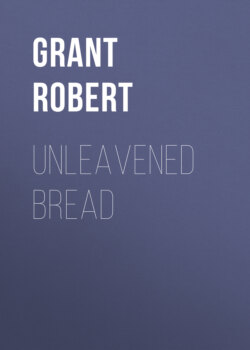Читать книгу Unleavened Bread - Грант Роберт - Страница 9
На сайте Литреса книга снята с продажи.
Оглавление"And you?" he said. "You are a student, too. Mrs. Taylor has told me, but I should have guessed it. Duties even more interesting claim you now, but it is easy to perceive that you have known that other happiness, 'To scorn delights and live laborious days.'"
His words sounded musical, though the quotation from Lycidas was unfamiliar to her ears. Her brain was thrilling with the import of all he had told her—with his allusions to the intellectual and ethical movements of Boston and New York, in which she felt herself by right and with his recognition a partner and peer.
"You were teaching school when you married, I believe?" he added.
"Yes."
"And before that, if I may ask?"
"I lived at Westfield with my father. It is a small country town, but we tried to be in earnest."
"I understand—I understand. You grew up among the trees, and the breezes and the brooks, those wonderful wordless teachers. I envy you, for they give one time to think—to expand. I have known only city life myself. It is stimulating, but one is so easily turned aside from one's direct purpose. Do you write at all?"
"Not yet. But I have wished to. Some day I shall. Just now I have too many domestic concerns to—"
She did not finish, for Babcock's heavy tread and whistle resounded in the hall and at the next moment he was calling "Selma!"
She felt annoyed at being interrupted, but she divined that it would never do to show it.
"My husband," she said, and she raised her voice to utter with a sugared dignity which would have done credit to Mrs. Taylor,
"I am in the parlor, Lewis."
"Enter your chief domestic concern," said Littleton blithely. "A happy home is preferable to all the poems and novels in the world."
Babcock, pushing open the door, which stood ajar, stopped short in his melody.
"This is Mr. Littleton, Lewis. The architect of our new church."
"Pleased to make your acquaintance." And by way of accounting for the sudden softening of his brow, Babcock added, "I set you down at first as one of those lightning-rod agents. There was one here last week who wouldn't take 'no' for an answer."
"He has an advantage over me," answered Littleton with a laugh. "In my business a man can't solicit orders. He has to sit and wait for them to come to him."
"I want to know. My wife thinks a lot of your drawings for the new church."
"I hope to make it a credit to your city. I've just been saying to your wife, Mr. Babcock, that Benham has a fine future before it. The very atmosphere seems charged with progress."
Babcock beamed approvingly. "It's a driving place, sir. The man in Benham who stops by the way-side to scratch his head gets left behind. When we moved into this house a year ago looking through that window we were at the jumping-off place; now you see houses cropping up in every direction. It's going to be a big city. Pleased to have you stop to supper with us," he added with burly suavity as their visitor rose.
Littleton excused himself and took his leave. Babcock escorted him to the front door and full of his subject delayed him on the porch to touch once more on the greatness of Benham. There was a clumsy method too in this optimistic garrulity, for at the close he referred with some pride to his own business career, and made a tender of his business card, "Lewis Babcock & Company, Varnishes," with a flourish. "If you do anything in my line, pleased to accommodate you."
Littleton departing, tickled by a pleasant sense of humor, caught through the parlor window a last glimpse of Selma's inspired face bowing gravely, yet wistfully, in acknowledgment of his lifted hat, and he strode away under the spell of a brain picture which he transmuted into words: "There's the sort of case where the cynical foreigner fails to appreciate the true import of our American life. That couple typifies the elements of greatness in our every-day people. At first blush the husband's rough and material, but he's shrewd and enterprising and vigorous—the bread winner. He's enormously proud of her, and he has reason to be, for she is a constant stimulus to higher things. Little by little, and without his knowing it, perhaps, she will smoothe and elevate him, and they will develop together, growing in intelligence and cultivation as they wax in worldly goods. After all, woman is our most marvellous native product—that sort of woman. Heigho!" Having given vent to this sigh, Littleton proceeded to recognize the hopelessness of the personal situation by murmuring with a slightly forced access of sprightliness
"If she be not fair for me,
What care I how fair she be?"
Still he intended to see more of Mrs. Babcock, and that without infringing the tenth or any other commandment. To flirt with a married woman savored to him of things un-American and unworthy, and Littleton had much too healthy an imagination to rhapsodize from such a stand-point. Yet he foresaw that they might be mutually respecting friends.
